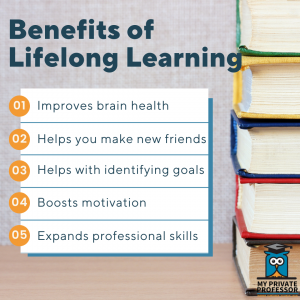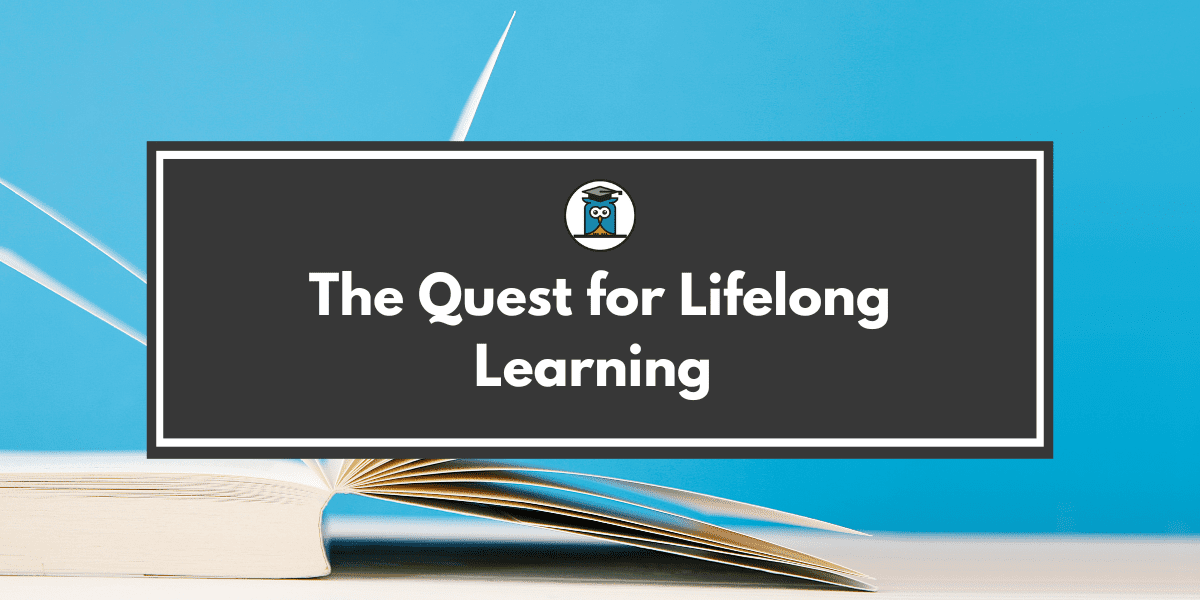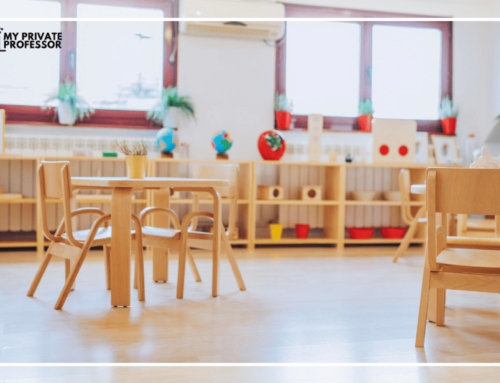“Learn as if you were to live forever,” Mahatma Gandhi encouraged.
While this might strike you as deep and heartfelt upon first reading, you’ll certainly think differently from time to time. For instance, when you’ve finally graduated from school.
Upon leaving your years of education, are you looking for more homework? Probably not. You might be excited. You might have a bucket list of items to complete—items that you certainly couldn’t check off in school. Skydiving? Traveling the world?
It’s fair to say that education can hold you back when it comes to these kinds of things. While traditional education can provide you with newfound knowledge and skills, it also comes with a ton of work (which means time).
With all the studying, writing, reviewing, note-taking, memorizing, and presenting, it’s no wonder that you may jump at the chance to be done. Done with group projects, done with due dates, and you know what, done with learning all together!
But in reality, we’re often more eager to learn than we realize.
Learning, for many of us, doesn’t end with school. After gallivanting around for a while after graduation, you may come to the realization that you actually—horror of horrors—miss learning.
What is lifelong learning?
Lifelong learning is generally defined as the continual, voluntary, and self-directed chase for knowledge. And this can be professional or personal. As you may recognize, self-learning can help you understand your desires and goals—and take action.
Even if you have landed your dream job, you might feel that something is missing—or that you’re reaching for more. Remember: this is human. Lifelong learning, as a concept, recognizes that beyond school and career, humans have an innate curiosity for knowledge.
And the things you learn don’t have to fall under traditional categories (in the science, literature, math fields). You can follow your desires. Maybe you want to learn how to sail, or perhaps you’ve always wanted to learn the ins and outs of real estate.
More than just a curiosity for knowledge—it’s important to remember that we, humans, have the capacity to expand our knowledge. For instance, during the pandemic, we all engaged in a collective effort to learn new skills related to digitalized lifestyles. When you feel as though you’re in a rut, it’s critical to remember that you have the strength and human power to break out—and identifying a new passion, project, or interest may be the cure.
Whether or not you have personal feelings against Dr. Seuss, he did get one thing right:
“The more that you read, the more things you will know. The more that you learn, the more places you’ll go.”
He hit it on the nose. If you’re continually on the quest for knowledge, you will go more places. And don’t get me wrong—this doesn’t mean that people who learn more are bound to travel more. When I say “go more places”, I mean physically, mentally, and spiritually.
The age of technology is a lifelong learner’s best friend
With endless (literally) pages of information at your fingertips, now’s the time to learn. One major benefit to all of the technological advancements in our society is that you can now learn from the comfort of your own space.
Plus, technology has allowed us to break down many barriers of access to learning.
The pandemic birthed online learning as a new normal, and from that, we are starting to see the value in digital learning.
You no longer need to enroll in a class where you’ll be surrounded by strangers. It’s not even a prerequisite to be in a metropolitan area! You can literally be in the comfort of your home in a completely rural area, and pick up your new passion.
If you’re struggling with where to start, consider:
- Listening to a podcast series
- Reading scholarly articles
- Following blogs
- Watching tutorials
- Exploring Ted Talks
Benefits of lifelong learning
Whatever it is you decide to take on, lifelong learning can empower you to achieve your goals and find personal fulfillment. It’s not only that, though.
When you provide yourself with regular opportunities to learn, you give yourself the chance to evolve, evolve, and evolve.
Lifelong learning improves your health.
While there’s the whole spiel on how learning is good for mental health, lifelong learning benefits your physical health, too. In fact, there’s a direct correlation between education and longevity. 
One review on the effects of education on health found that education is associated with lower mortality, lower risk of heart disease, and lower risk of diabetes.
In addition, a report in Neurology found that learning activities can delay symptoms of Alzheimers—and in turn, preserve life quality.
Lifelong learning helps you remain employed.
During a period where there are progressing rumors of robots taking over our jobs, continually learning new skills and knowledge can reduce your chances of getting booted (or bot-ed). If you’re always learning more, you’re inevitably expanding your potential in the workforce.
One report from the World Economic Forum demonstrates that expanding employees’ roles could result in a net creation of 5.4 million new jobs by 2030—and offer opportunities previously unavailable to them.
If you’re always on the quest for more skills and knowledge, you’re simultaneously boosting your potential to take on more responsibilities.
Lifelong learning boosts motivation.
Have you ever felt blocked? Blocked from creativity, inspiration, and/or motivation? If you haven’t, I’m sure some lab would like to do some testing on you.
When lost in the sauce, it can feel as though you’re flailing around, trying to hold onto something—anything that helps you move you forward. But without motivation, it can be tough for you to turn thoughts into action.
Lacking motivation often stems from not feeling connected to your work. Conversely, when your work inspires you, garnering motivation comes more naturally. So with lifelong learning, you identify what inspires you most, and then the motivation usually follows.
Lifelong learning helps you set (and achieve!) goals.
Once you’ve identified this new area of focus, you can start formulating goals. It’s a whole lot easier to craft goals when you’re tapping into something that drives your interest.
With motivation comes the ability to be more strategic and organized in your plan of action. So ride the momentum of your motivation, and set short- and long-term goals.
Lifelong learning helps you feel fulfilled.
Personal fulfillment…it seems like that’s often an end goal for many of us. On one hand, it seems like it can take a long time to get there. On the other hand, some people believe we’re always working towards it, and rather than an end goal, it’s an everlasting journey.
Lifelong learning recognizes the latter—that we’re always looking for more—and how, specifically, we’re always looking for more to learn.
Through this continual learning, rather than seeking an end goal, you’re constantly feeding your brain—and thus constantly feeding the desire to be fulfilled. 
Lifelong learning can bring you friends.
Even if you’re an introvert to the greatest extent, you can probably appreciate connecting with someone who shares your passion.
When you commit to dedicating some of your time to this one specific area, you raise the possibility of meeting people who are doing the same. And it can really be a gift when you can connect with people about something that brings you joy, curiosity, and excitement.
How to implement lifelong learning into your life
The first step to becoming a lifelong learner is simply connecting with yourself and determining what you want to learn. Be careful here—you’re not looking outward to see what you think you should learn—but looking inward and identifying your passion(s).
What do you want to learn?
First, you’ve got to do the hard part: thinking. A vital part of the lifelong learning process is reflecting on what’s meaningful to you. Start by asking yourself questions such as:
- What are some of my unmet long-term goals?
- What am I working towards?
- What’s missing from my life?
- What have I always wanted to learn about?
- What brings me excitement?
And perhaps the most important question: What do I want to learn? A common mistake here is to quickly come up with the first things you can think of—or what you think you should want to learn. But if personal fulfillment and satisfaction are truly important to you, you’ll want to be reflective and take the time to look into your inner thoughts and desires.
Essentially, you’ll want to avoid the influence of external sources such as your parents, your friends, and social media.
This doesn’t mean you can’t look to these sources for inspiration—you can and should. But rather than asking them what you should learn, consider engaging in a “brain dump” type session, where you have a more open-ended discussion about curiosities, interests, and where you see yourself going.
And while this isn’t physically labor-intensive, it can be mentally challenging.
What resources are available to you?
Whatever you’re looking to learn, resources are vital. And even if you’re not yet making the big bucks that seem necessary to starting a new endeavor, there are more resources at your disposal than you realize.
For instance, if you can’t afford to enroll in a program or class, try seeking out an expert in the specific field—and pick their brain. Perhaps this expert is closer than you realize. Tap into your closest friends and relatives, or your colleagues, and see whether they know a thing or two about the specific field.
Of course, the internet is your best friend when it comes to lifelong learning. On the web, you can find an endless number of free articles, worksheets, podcasts, cheat sheets, stories, etc. This means that there’s really no excuse to not start your lifelong learning journey.
How can you alter your schedule?
You’re committing to implementing new learning into your daily life. Does your current schedule allow you to do this? If not, you’ll have to make some schedule changes.
These probably won’t need to be drastic changes. After all, you’re likely holding onto most of your typical responsibilities—whether that be homework, tutoring, work, parenting, sports, etc.
But these changes must be deliberate. For instance, if your schedule is jam-packed, you’ll need to eliminate something in order to make room for your new learning. If you don’t think you can do this, maybe you can cut it out every other day, and on the remaining days, cut out something else.
Final thoughts
All in all, becoming a lifelong learner can help you in several awesome ways, and importantly, can empower you to understand yourself better.
Just remember: even if it seems that your life is going one way, it’s never too late to start your quest for lifelong learning.
Author: Lydia Schapiro








